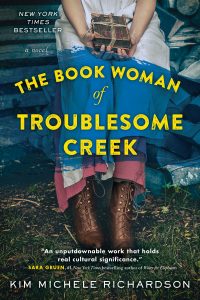Book Review: The Book Woman of Troublesome Creek, by Kim Michele Richardson
By Julia Padgett

Yes, this is a book about a long ago librarian, and full disclosure, I am a librarian. However, this is not your normal librarian, setting, or merely a history lesson. Richardson pulls on the unique time period when Kentucky utilized pack-horse librarians to navigate the rough terrain, trails, and natural elements to deliver books to those living in desolate and hard to reach places. She highlights the intense poverty and hunger of the region, difficulties of funding for materials, and how necessity can lead to creative solutions when it seems everything is stacked against you. Her characters are all desperately trying to find a way to feed their families, themselves, and their souls. It is rewarding to see how books (and literacy) can help lift even the most depressed and alienated. All of that would be enough of a story to tell, but The Book Woman’s title character also happens to belong to one of the Kentucky blue-people—a small population that had blue skin due to a genetic blood condition. They confronted racism, alienation, and violence for their different appearance. Cussy, the pack-mule librarian, has to learn to fight the intense prejudices of some in her community and her own desire to be like everyone else. She learns tough lessons about pride and humanity—making her a brave, independent woman in the end. She also sees first-hand how she can make a difference, build friendships, and lift those around her. The Book Woman of Troublesome Creek takes on tough topics, some of which we are still facing today. Keep you tissues on hand and enjoy the route that Cussy and her mule, Junia, traverse, the people that they encounter, and the reminder about the power of the written word. There are several reasons a librarian may be drawn to The Book Woman of Troublesome Creek, so forgive me for this seemingly obvious choice to review. However, the deeper messages of how we need connection, compassion, and understanding are universal and make it worth the read.


Add a comment to: Book Review: The Book Woman of Troublesome Creek, by Kim Michele Richardson